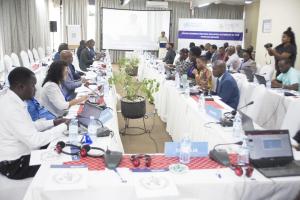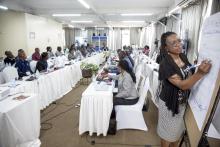WHO discusses Mpox and Marburg cross border interventions in African region
Kampala. The World Health Organization Africa Regional Office (AFRO) has convened a four-day cross-border meeting of health experts and partners from the Burundi, Democratic Republic of the Congo (DRC), Kenya, Republic of the Congo, Rwanda, Somalia, South Sudan, Tanzania, and Uganda to discuss the ongoing outbreaks of mpox, Marburg and other public health threats with potential for international spread. The meeting sought to assess implementation of continental and global conventions while identifying critical gaps in cross border collaboration to build resilient health systems coupled with mobilizing resources.
Improvement in international travels has greatly facilitated the ease and speed with which diseases spread from one country to another. There is also increased population mobility due to social relations and homogeneous community, economic activities, forced migration, among others.
“Cross border collaboration ensures prompt detection and response to disease outbreaks, standardized surveillance protocols, improved information, and promotes regional and global cooperation,” said Dr. Charles Njuguna, the Acting World Health Organization Representative to Uganda.
The African region is vulnerable to multiple disease outbreaks and other humanitarian emergencies. WHO declared mpox a public health emergency of international concern on 14 August 2024 following the sharp surge and transmission of cases across borders on the continent. Several mpox cases were detected at or near points of entry such as in Uganda, Rwanda, and Kenya. On 26 September 2024, Rwanda announced the confirmation of Marburg Virus Disease. The possibility of cross border transmission cannot be ruled out.
The International Health Regulations (IHR 2005) call on member states to build and strengthen their capacities to prevent, detect, control, and effectively respond to any public health threat or event and work towards containment while minimizing the effect on international travel and trade.
"Migration cannot be safe if it is not healthy. And healthy migration means that people on the move are not catching or transmitting diseases at any stage along the mobility continuum," said Dr. Risatul Islam, the Chief Migration Health officer at the International Organization of Migration, Uganda.
Agenda 2063 of African Union has as one of its priorities on the continent the realization of seamless borders, and management of cross-border coordination through dialogue. Furthermore, Article 118 of the Treaty for establishment of the East African Community, Partner States, agreed to take joint action towards the prevention and control of communicable diseases and to control pandemics and epidemics of communicable and vector -borne diseases that might endanger the health and welfare of the residents of the Partner States.
“The critical role of cross border surveillance in early detection, control, and prevention of transboundary public health threats cannot be overemphasized. It accelerates implementation and compliance of international health regulations through joint actions such as risk communication and community engagement,” said Dr. Mazyanga Lucy Liwewe Mazaba, the Regional Director for the Eastern Africa Regional Coordinating Centre of the Africa CDC.




